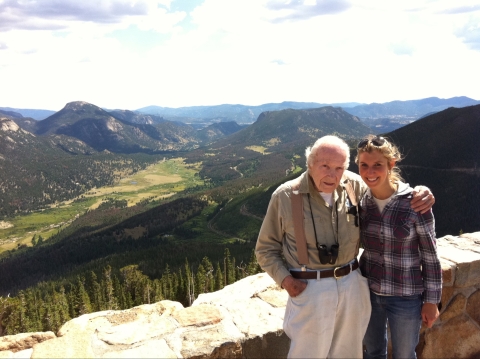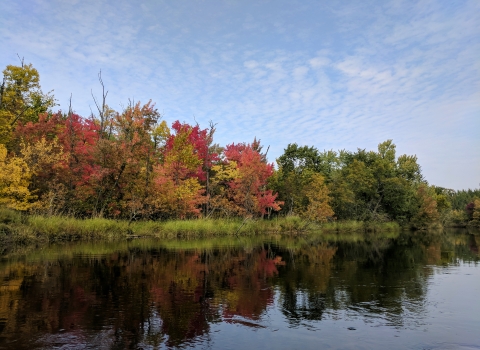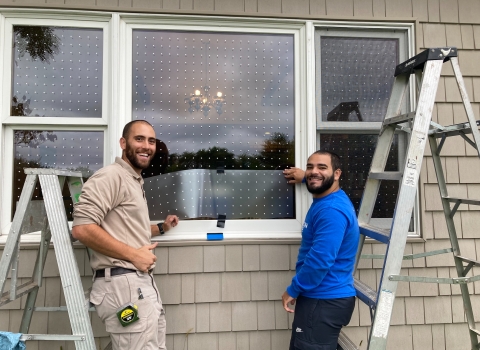By Jan Peterson, for the U.S. Fish and Wildlife Service’s Pacific Region
Chelsea McKinney has spent her entire professional life learning about wildlife and habitats and sharing what she’s learned with others. Today, McKinney is helping aspiring conservationists from diverse communities to follow their passions to rewarding careers in the U.S. Fish and Wildlife Service.
How did you become interested in a career in conservation?
As a junior in high school, I happened on the Student Conservation Association and was selected for a six-week backpacking work adventure. It was so remote, water was brought in on mule.
It was kind of my vision quest. By the end of the six weeks, I would have traded my first shower to be in conservation. There was no doubt in my mind that it would bring me happiness.
In my first year at the University of Maine, I found possible jobs through some conservation organizations. I met Linda Welch from the U.S. Fish and Wildlife Service and learned about this job on a desolate island 12 miles off the coast of Rockland, Maine, studying roseate, common, and arctic terns. It was really remote – it had an outhouse, solar power for charging phones and laptops for data entry. Just coming off that backpacking trip, it sounded great so I went over and said, “Hi, Mrs. Welch, I think I’d be great for that job.” When she asked me how much birding experience I had, I said “None, but I can go six weeks without a shower.” We stayed in touch. I started studying birds and became a squeaky wheel. I was offered the job. I called my mom from the island and said, “I’ve just counted 2,000 terns, the harbor seals are sunning on the rocks and the lobster boats just came in from their haul. I can’t believe they’re paying me to do this.”
I then went to grad school before becoming a permanent Service employee.
Who or what has inspired you along the way?
Wildlife is what got me into it, but the people I work with made me want to stay. Every supervisor I’ve had has been a mentor. They’ve made me a part of their community, and I think that has made me not want to look anywhere else.
Growing up, I wanted to be the next Jane Goodall or H. Robert Krear, who died at 95 in 2017. Everything Dr. Krear did was inspirational. He was part of the 10th Mountain Division, an Alpine ski division that trained at Camp Hale, and he served in World War II. The best of the best went out there. He later met Olaus and Margaret Murie and was asked to be one of five members of the 1956 Olaus Murie Arctic Brooks Range Expedition that led to the creation of the Arctic National Wildlife Refuge.
Bob was a great photographer and filmmaker. He filmed that expedition and had a way with people. If you had the chance to meet him, you were instantly attracted to him. I was no different. I was brand new to the Service and I met him celebrating the 50th anniversary of the establishment of the Arctic National Wildlife Refuge. I was just in awe of him and his life and the experiences he had. He was a pretty incredible person.
Tell me about your job. What do you do day to day?
My current role is the Regional Intern and Fellow Coordinator. It entails looking at intern programs and utilizing special hiring authorities to advocate ways in which to recruit more racial and ethnic diversity in the Service. Our work force has been very homogenous. We looked at retention and recruiting and saw we need to do a better job of reflecting what the face of America looks like.
I’ve been asked to be bold in coming up with new programs and how to build new relationships. Within the pillars of Diversity, Equity and Inclusion (DEI), we are looking at engagement, barrier analysis and recruitment. My job is to help recognize hiring barriers and biases and implanting various hiring authorities that target diversity.
Your career has included outreach in so many ways – to children, to volunteers and now, to people just launching their careers. What inspires this passion?
I went in it for the wildlife, but I feel like I’ve had such meaningful relationships in the Service I’d like the opportunity to pay it forward. We know that minority groups have a lot of different barriers. We’ve heard from people who left the Service say they felt isolated or not a part of their work community.
I want to ensure stations are inclusive, and that goes beyond the working hours. Often times interns move to new locations, stay in intern or bunk houses and don’t know the area. Part of being a good supervisor is ensuring they are included within the community at work, but also outside of work.
Why are internship programs so important?
The problem we’ve seen is we are hiring for very technical skills. We must better train our staff to understand that interns are an investment. It is not expected they come in with the technical skills needed. We must redefine what “most qualified” means. Competencies – such as “Do they have the ability to learn the skill? Can they manage multiple tasks? How is their decision making process in difficult situations?” – must hold similar weight. Selecting the PhD or person with the “most skills” should not automatically hold more weight. An internship is about investment, and providing opportunities to those that want to gain new skill sets. Data shows that as we hire for technical skills alone, racial/ethnic diversity are negatively impacted. Incorporating competencies and educating staff with trainings such as “Unconscious Bias in Hiring Panels” and other DEI workshops, could greatly increase our diversity in the Service.
During my internship time, the mentality was you had to start at the bottom and get paid little to no money – everyone had to “put in their time” Many BIPOC groups aren’t afforded that same privilege. For example, my mom was a teacher in an urban community, and many of her students were falling asleep not because they were out partying the night before, but because they were working night jobs after school to help their families. They would never be able to afford to take on volunteer or low paying internships.
This is a barrier the Service is beginning to recognize. In the Pacific Region, we are providing jobs that meet or exceed minimum wage in addition to a housing stipend. This provides opportunities they can actually afford to take and gives them the experience they need to apply for future jobs.
How and why do you build relationships with student organizations?
We need to be thoughtful on the relationships we build with our partners. For example, Service biologist Nicole Hams, an alumni of the MANRRS (Minorities in Agriculture, Natural Resources and Related Sciences) Chapter at Oregon State University, had an amazing idea of building an internship program. Together, we met with chapter advisers at Oregon State, Washington State and the University of Idaho and asked, “What can we do for you?” They said, “Keep showing up. Come to our chapter meetings and build relationships with our students because with the federal government, there is a lot of distrust.”
Here I thought a federal job was the golden ticket that everyone sought. I was very wrong. Some were suspicious. Some family members weren’t legal residents. How would background checks interfere with their families?
We did a series of six workshops on how to build a federal resume. We talked through all the programs, conducted mock interviews, allowed them to ask questions and more. We built the relationships. We kept showing up. We got them ready to apply for the MANRRS intern program for incoming sophomores. They didn’t have to have any experience. If they had an interest in conservation, we wanted to build on that.
We created an internship opportunity around them. The application process was completely different. The hiring supervisors wrote about themselves. They talked about their life story, and their passion. By the time you read the position description, they’d already painted a picture of the culture, community, and engagement efforts of the people, that the applicant felt they wanted to work for that person regardless of what the job entails.
Internships are not about getting the work done. They’re about building experiences for the intern. It is a hard mentality to change that our investment needs to be in them not the other way around.
What is your advice for those who hope to follow in your footsteps?
I would say to be bold. Think outside of what we traditionally do and how we traditionally think. We need change, and the time is now. I think the Service is ready to listen to bring in new ideas and bold ideas, and I don’t know of a better generation to do it than this one.
For more information on internship opportunities in the Pacific Region, contact Chelsea McKinney at chelsea_mckinney@fws.gov. The U.S. Fish and Wildlife Service strives to build a workforce that reflects the public that we serve, creating a workplace where all backgrounds, abilities, beliefs, genders and orientations are welcome and valued for the array of ideas that they bring toward fulfilling the Service’s mission.


